|

Winter 2005 (13.4)
Pages
32-35
Confessions - Nariman Narimanov
My Dear Son, Let Me Tell You What It Was Really Like
Letter written
by Nariman Narimanov to his only son Najaf, 5, in 1925
  Nariman Narimanov (1870-1925) was 55
years old when he wrote this letter to his son Najaf, who was
only six years old at the time. It seems that as someone, who
had started a family late in life, he wanted so desperately to
explain himself - to give his child the chance to know him, and
to air his misgivings about the Bolsheviks, whose political agenda
had been one of the motivating forces in his life. Nariman Narimanov (1870-1925) was 55
years old when he wrote this letter to his son Najaf, who was
only six years old at the time. It seems that as someone, who
had started a family late in life, he wanted so desperately to
explain himself - to give his child the chance to know him, and
to air his misgivings about the Bolsheviks, whose political agenda
had been one of the motivating forces in his life.
Left:
Nariman Narimanov, Chairman
of the Soviet of Peoples' Commissars, with his son Najaf.
While penning these thoughts, Narimanov may well have sensed
that his life was in jeopardy because he had been so outspoken
against Stalin. As it turned out, less than six weeks later (March
19, 1925), Narimanov died under mysterious circumstances.
The official cause of death was listed as heart attack (and,
it's true, he was known to have heart trouble), but many suspect
that Stalin himself had something to do with Nariman's sudden
death.
Nariman's Death
Kamila, Director of the Narimanov Home Museum, and great granddaughter
of Salman Narimanov, the brother of Nariman Narimanov says that
on the day before Narimanov died, he had had an argument with
Stalin about an issue regarding Azerbaijan. For some reason,
Narimanov had to leave the meeting in the middle of the discussions.
On his way back home, he insisted walking alone by himself and
not to be driven with the chauffer.
The driver followed in the car. On his way, suddenly Narimanov
collapsed. Emergency assistance was called, but Narimanov, a
doctor by profession himself, died anyway. He had always complained
about his heart. His wife felt that the argument with Stalin
had affected his heart though the court disallowed any foul play
associated with Narimanov's death.
Kamila is convinced that her grandmother knew more about the
circumstances, but was afraid to tell her family lest it jeopardize
them. And so, this is the version of the story that has been
passed down through the family.
Whatever the circumstances may be, Narimanov's death preceded
the years 1937-1938 by a dozen years. These are the years generally
associated with Stalin's first major purges. A state funeral
was held in Narimanov's honor - a practice that soon became a
tradition when top governmental officials were no longer useful
to the regime and died under mysterious circumstances. Narimanov
grave is in Moscow on Red Square behind the Lenin Mausoleum along
with other notables of the Soviet period.
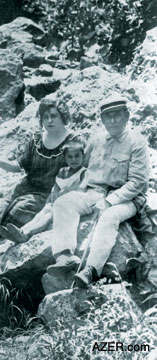  Bolshevism in Azerbaijan Bolshevism in Azerbaijan
Narimanov played a pivotal role in the establishment of the Bolshevik
power base in Baku. When the Red Army marched into Baku in April
1920, Narimanov was included in the Azerbaijani Revolutionary
Committee. He soon became its Chairman (May 16, 1920 to May 19,
1921).
Left:
Narimanov with his wife
Gulsum and son Najaf in Kislovodsk, Russia (1922). Photo: Narimanov
Home Museum.
In 1921, Narimanov headed
the Soviet government of Azerbaijan, the Council of People's
Commissars (May 1921 to 1922). In April and May 1922, he participated
in the Conference of Genoa as a member of the Soviet delegation.
Later that year, he was elected Chairman of the Union Council
of the Transcaucasian Federation. By the end of the year, on
December 30, 1922, the first session of the USSR Central Executive
Committee elected Narimanov, who represented the Transcaucasian
Federation as one of its four chairmen.
By the following April, he was made a candidate member of the
Russian Communist Party Central Committee (1923-1925).
Though Narimanov was trained as a physician, but he was known
more as a writer, having authored a number of books including
the novel Bahadur and Sona [1896] as well as the historical trilogy
Nadir Shah [1899]. He is also remembered for translating Nikolai
Gogol's "Inspector General" into Azeri. Narimanov's
son, Najaf, was born on December 2, 1919. He finished high school
in Moscow, joined the army in 1938 and graduated from military
school in Kiev in 1940.
He became a member of the Communist Party in 1942. During the
Great Patriotic War [World War II], he was a commander of a tank
division and involved in the liberation of Stalingrad and Donbas.
He died in battle, defending the city of Volnovakha in Ukraine.
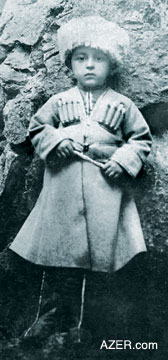  Nariman's Letter to His Son Nariman's Letter to His Son
The letter that Narimanov wrote to his son Najaf admitting his
misgivings about the direction that Stalin was leading the country
in 1925 has its unique own history. Fortunately, this rare document
has been preserved. After Narimanov died in 1925, Kalinin, as
Chairman of the All Union Executive Committee, would not let
Narimanov's family return to Baku, saying that it would not be
safe for them to live in Azerbaijan. So Gulsum and Najaf stayed
in Moscow.
Left: Najaf Narimanov, son of Nariman Narimanov,
in national costume when he was about three or four years old.
Photo: Narimanov Home Museum.
Gulsum died in 1956. Najaf had already been killed in the war
and, thus, there was nobody left in the family, so the government
put the apartment furniture up for sale. Prior to the sale, Gulsum's
brother Aslan went there and gathered all the documents and jewelry.
The letter that Narimanov had written to his son more than 30
years earlier was in the collection. So Aslan kept it in his
home in Moscow until the Museum opened in Baku in 1977.
Grand niece Sevil Mustafayeva bought the apartment furniture
and later made it available to the Museum as well. The letter
that Nariman wrote to his son follows:
My dear son Najaf, On January 15, 1895, the drama which I had
written and entitled "Ignorance" (Nadanlig) was staged
for the first time in the Taghiyev Theater in Baku. I consider
that day to be the launching of my literary work. Today - January
28, 1925 - marks 30 years since that day. Some of my friends
wanted to celebrate this occasion. I received telegrams from
them Of course, on a more serious note, I have not done anything.
Thirty years! Something could have been done during these years.
When I consider that length of time and compare it to what I
have succeeded to write, I become ashamed...
On the other hand, when I think about this amount of time, and
take into consideration all the circumstances of my life - the
crooked ways through which I have had to pass - I gain some satisfaction
that, at least, I have accomplished a few things. The situation
surrounding me, the backwardness, the passiveness towards development,
the indifference towards the events taking place around us, the
meaningless wars between nations, and the sufferings caused by
these battles - blood, tears, poverty, lies. These, and so many
other things, have always troubled me.
Everything I have written to this day bears witness to this sensitivity.
Maybe I haven't been able to describe the situation adequately,
maybe I haven't been very literary or skillful. But whatever
I have written, I did to the best of my ability. The effort proves
that I did not remain indifferent to the circumstances around
us as did so many others. My heart was not at ease. I endeavored,
and was trying so desperately, to make some contribution to humanity.

Above:
Najaf Narimanov with baby
cousin Sevil Mustafayeva who later purchased the furniture from
Narimanov's home after Narimanov's wife died. Years later she
made it available for the Narimanov Home Museum. Photo: Narimanov
Home Museum.
During these past 30 years, I have worked within society, and
this-only this-provides me with some consolation. If I was able
to infect at least 10 people with this "disease", then
my conscience can rest that I have not lived in vain, and that
I can take my place in some corner of this big, but at the same
time, very small world...
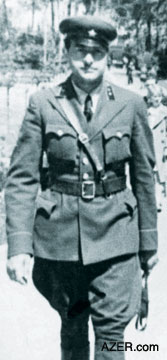  My dear
son Najaf! If I am fortunate enough to live longer, I will try
to enable you to do more for humanity than I have done. But if
my fate should be to leave this world sooner, please do a little
something for the people, just as your father has tried to do-your
father, who has always suffered for others. My dear
son Najaf! If I am fortunate enough to live longer, I will try
to enable you to do more for humanity than I have done. But if
my fate should be to leave this world sooner, please do a little
something for the people, just as your father has tried to do-your
father, who has always suffered for others.
Left:
Najaf died in Ukraine as
a soldier in World War II. Photo around 1942. Photo: Narimanov
Home Museum.
My life has always been full of difficulties. I had to take care
of the families of my brothers and sisters when I was only 20
years old. I have supported 11 people during these 30 years.
On my own salary, I married off eight girls and took care of
three sons of my brother.
After accomplishing all this, I started to pursue my own education.
I was 30 years old when I entered the university. Upon graduation,
I was occupied with trying to take care of the children of my
brother Salman [who died in 1907, and whose wife died the following
year].
I have been freed from all of these responsibilities only now,
when in 1924, I married off Khanim, the youngest daughter of
my brother.
I'm writing this in 1925-a year later. The reason why I write
all these things is because I don't want you to criticize me
for doing so little for humanity. I hope you'll follow my example
in your own life.
My dear son! If you examine my life, you'll see that I have lived
for others. What will happen later? I will continue in this same
way. I find consolation only in this kind of social involvement,
especially because the current situation in Russia now coincides
with my spiritual world.
I'm against the exploitation of human beings. I'm totally against
slavery. I have been trying to seek ways for humanity to be free
and to be rid of slavery at the earliest possibility.
|
"We must say it
openly: we became so arrogant with power that we occupied ourselves
with meaningless issues and arguments, and we forgot about the
real work we had to do."
-- Nariman Narimanov, Chairman of the Soviet
of Peoples' Comissars,
in a letter to his son, Najaf, age five, in 1925.Six weeks later,
Narimanov, 55, was dead under rather suspicious circumstances.
|
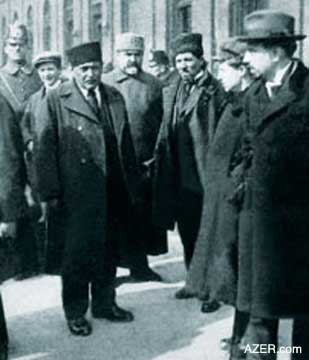  I was
a Social Democrat, but these days, more and more, I discern that
they are abandoning their goals. I was
a Social Democrat, but these days, more and more, I discern that
they are abandoning their goals.
Left:
Nariman Narimanov at the
railway station in Berlin going to a conference in Genoa, Italy,
with the delegation. April 1, 1922. Photo: National archives
of Azerbaijan.
I used to have confidence in the agenda of the Bolsheviks and
envisioned my own goals being fulfilled through them. I thought
slavery would be abolished in the world this way.
Maybe Bolshevism won't exist by the time you read these lines.
But if that be the case, it doesn't mean that we don't need Bolshevism.
It means that we were not able to save it, that we underestimated
it, and that our attitude towards these goals was shortsighted.
We must say it openly: we became so arrogant with power that
we occupied ourselves with meaningless issues and arguments,
and we forgot about the real work we had to do.
Power destroys most people. And thus it has happened: power has
spoiled most of our outstanding leaders. They decided to take
control of the fate of a great state and become dictators...
It was necessary at the beginning. But to continue this path
today will cause Bolshevism to collapse.
  Now,
as I write these lines to you, the situation is that the Communists
can't even talk among themselves about our major mistakes that
have been caused by those carelessly ruling the government who
have declared themselves as "the heirs of Lenin" after
his death. Now,
as I write these lines to you, the situation is that the Communists
can't even talk among themselves about our major mistakes that
have been caused by those carelessly ruling the government who
have declared themselves as "the heirs of Lenin" after
his death.
Left:
Narimanov as Chairman of
the Soviet Peoples' Commissars with his wife (1920). Photo: National
archives of Azerbaijan.
You'll understand more fully about these issues from the extensive
speech that I have written for the Central Committee. You'll
become aware of many things through that speech.
You'll understand that your father was not afraid of saying things
that most others didn't have the courage to say, or did not want
to risk saying, out of fear of losing their position and power.
My dear Najaf! Don't run after power. It ruins a man. If you
want to know a person and learn of his or her inner world, appoint
him to a high position for a period of time.
All of that person's capabilities as well as his shortcomings
will be revealed. That's why, if you are not ready to support
the people without lying to them, then it's better to refuse
such a position.
If the masses (workers and villagers) appreciate you, and consider
you to be the right choice to come to power, if they have faith
in you and if you are able to provide them some common good,
then don't refuse.
But if you sense that someone is forcing people to support you,
then refuse. If you don't, you'll lose your dignity, not only
among the masses, but within yourself as well. Whenever you suspect
that you have come to power because somebody has appointed you,
and not because you have achieved it on your own, then you will
always feel guilty and lose your dignity. Confusion in your world
vision will begin from there.
This is the most crucial moment in the life of a political figure.
You can bear all of these things only when you are ready for
independent life. What does that mean? To illustrate this, let
me give an example from my own life.
|
"Power destroys
most people. And thus it has happened: power has spoiled most
of our outstanding leaders. They decided to take control of the
fate of a great state and become dictators It was necessary at
the beginning. But to continue this path today will only cause
Bolshevism to collapse."
-- Nariman Narimanov
in a letter to his son, 1925
|
You already know that I had been accepted into the university.
But then my mind was occupied with the question, "Which
university should I enter?" Circumstances in my life, in
addition to my advanced age, made me eager to complete my education
as soon as possible. That's why I had to choose a faculty, which
would not make demands upon my limited time. Should I get involved
in the Law Faculty (it was considered an easy faculty back then),
or Nature (a four-year course)? After finishing either of these
faculties, I still would have had to rely upon various individuals
and organizations. That's why I refused and chose, rather, to
study medicine so that I would be less dependent upon others.
This was one reason.
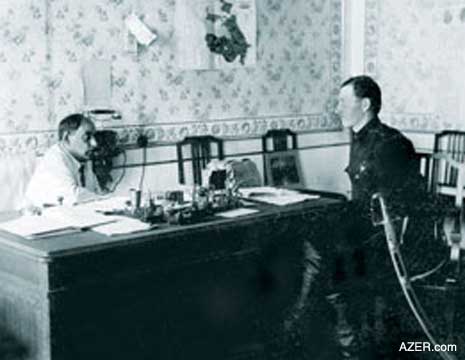
Above:
M. G. Efremov, chief of
the troops of the 11th Red Army, which entered Baku in armored
trains, with Narimanov as chair of the Azerbaijan Revolution
Committee (1920). Photo: National archives of Azerbaijan.
Another reason was that your grandmother (my mother) was a very
kind hearted and modest person. She used to help those who were
in need. She would take care of neighbors who were ill and share
her bread with them. I grew up witnessing these things as a child,
and they had a profound influence on me That's why I decided
to enter the Medical Faculty even though it was a difficult field
and required a longer period of time to finish. I chose it so
that I wouldn't have to be dependent upon various individuals
and organizations and so that I would get more spiritual fulfillment
from my work...
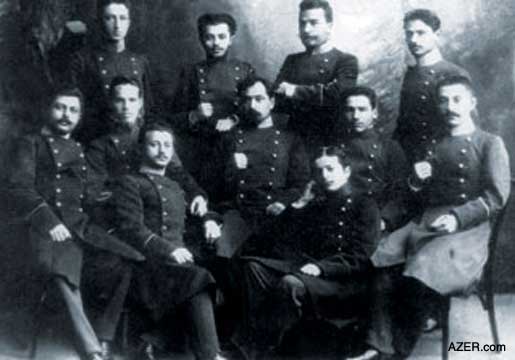
Above: Narimanov as a medical student at the
Medical Faculty of Odessa University. Narimanov is standing,
far right (1910s). Photo: National of Azerbajian.
Unfortunately, Narimanov never finished his letter. He died less
than six weeks later. But it is likely that this letter did more
to save Narimanov's reputation among Azerbaijanis after they
gained their independence (1991) than any other single document.
To this day, Narimanov's statue still stands in one of the most
prominent locations in Baku. Other statues troughout the city,
which memorialized leaders of that repressive government - such
as Lenin, Stalin and Kirov - have long since been dismantled.
Narimanov's letter to his son
was published in the book: "About the History of our Revolution
in the Provinces" by Nariman Narimanov, compiled by Academician
Pusta-khanim Azizbayova. Baku: Azarnashr, 1992, pages 64-67.
Translation from Azeri by Ulviyya Mammadova.
Back to Index AI 13.4 (Winter
2005)
AI Home
| Search | Magazine
Choice
| Topics
| AI Store | Contact us
Other Web sites
created by Azerbaijan International
AZgallery.org | AZERI.org | HAJIBEYOV.com
|









